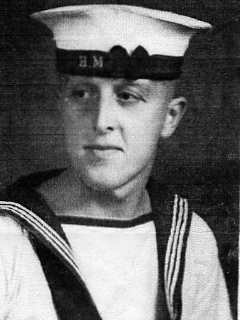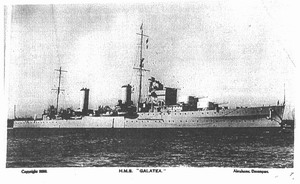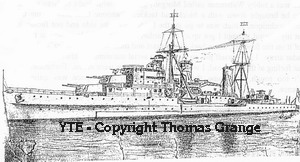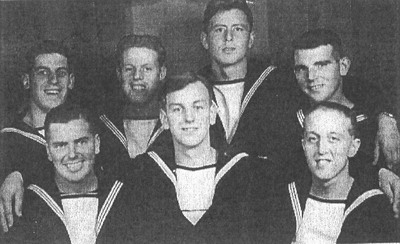The voyage out to the Med was marvelous, there were no submarine scares, no air raids, and it was just like a holiday cruise. Off watch, we lay on the decks and sunbathed or stood at the rails watching the flying fish. The sky and the sea were pure blue and the sun blazed down, even across Biscay. We stopped at Freetown for 4 days to make up provisions; we had run out of potatoes or very nearly, but unfortunately they didn't have any in Freetown either, and loaded us up with yams instead. They were horrible, so in our mess (No. 43) they went the same way as tinned pilchards, out of the galley, down to the mess and straight out through the scuttle. It was good to get ashore at Freetown, although as far as I remember it was more or less a wooden shanty town. There wasn't much to see; I got ashore on three occasions, sampled the local beer and had a long walk out into the country. The guides brought us back a different way, so they could piggy-back us across a river and demand ‘substantial remuneration’. We got the usual exhortations from the MO and his staff regarding drinking the water, eating the local food and not associating with the local females, but the number of cases of stomach pains on the second stage of the journey to Durban seemed to indicate that many people hadn't taken much heed of the advice. Also, a P0 Tel. and a Tel. (not me) reported sick with VD before we arrived at Durban. We had a ‘crossing the line’ ceremony on this leg, which was quite an occasion.
The weather held until we started to go around the Cape and one night it blew up really rough, and like the mirror sea at Falmouth, I never saw the like again. I never saw it as rough as going round the Cape; the mess deck was inches deep in water and at one mealtime someone had slipped down the ladder with a tray of sausages, bacon and eggs, and they were sloshing around as well. It was during this storm that ‘Brilliant’ sprained her keel and cracks appeared in the bottom plates.
We were told that two merchant ships had gone alongside on both sides to break the seas, but whether this would have been possible in seas like that, I don't know, but ‘Brilliant’ detached to Simonstown for repairs.
We eventually arrived at Durban and stayed there for 5 days. It was 5 days leave almost, the weather was just what one would expect of South Africa. A line of cars was waiting on the jetty and as liberty men went ashore, they were offered ‘up homers’ by the local people, and offered ‘adoption’ for the duration of our stay. Bungy, Johnnie Cardwell and I were whisked off to a ranch-type house way out of town, wined and dined like royalty and delivered back to the ship at the appointed time. We made arrangements for a further visit and they picked us up again; we visited them quite a few times altogether and also had a few runs ashore in the city itself. They wrote to my parents to let them know I was ok and of my whereabouts. I suppose it was a breach of security in some respects, but the authorities must have known it was going on; they also sent them a roll of silk dress material as a gift. I still have the letter, but I don't know what happened to the silk, although I knew it landed safely.
The next leg was to Aden and it was another repeat performance as regards weather, but Aden brought the war back. We anchored not far away from an Australian destroyer, the Nizam’, which had had its stern blown off at Crete and was on passage back to Australia for repairs. We didn't get ashore at Aden and only stopped there 2 days before going on up the Red Sea to Port Suez, where we went straight in through the Canal to Alexandria and joined the l5th Cruiser Squadron (this would be about early August). At that time, the l5th CS consisted of Naiad (flagship), Phoebe, Dido, Neptune, Ajax, Euryalus, Coventry and us. They were all modern cruisers except Coventry, which was a fairly old ship and had been converted to what was termed an ‘anti-aircraft cruiser’, but compared to all the high-angle armaments on the rest of us, it was a joke. In Alex there were also a couple of destroyer flotillas and the 2° Battle Squadron, comprising Valiant, Queen Elizabeth and Barham. The Valiant and QE were sunk by Italian frogmen in Alex harbour a couple of months later, which left only one battleship in BS 2. They captured the frogmen and took them into the bottom of the ship, but I don't think they were fast enough and the mines went off
The next few weeks we did ‘sweeps’ up the Med, coastal bombardment, and other duties. A sweep would last 5-10 days and then we’d go back to Alex for a few days. Shore leaves in Alex were spent at one of the many service clubs, e.g. Fleet Club, Jewish Club, or one of the more numerous cabaret-type clubs. As with all naval bases, a vast amount of beer was consumed and I must say that I consumed my share. The beer hall at the Fleet club was the favourite venue for this. They also had a good Tombola game there and hundreds of matelots played, so the ‘house’ sometimes reached a tidy sum. The first time I played I called house, but it was a false call and I felt like crawling under the table. The cat-calls were deafening, but the following week I won £46, which was a fortune then; they couldn't pay out a large amount like that in cash so it was paid into my ship’s pay A/C and I was able to draw it as needed, and I needed it pretty badly. Besides losing my kit-bag, the pay details of the three of us had been misplaced and we were only getting ‘casual’ payments. In my case this was about 15 shillings (75p) per week, so things were a bit thin and I could only manage a couple of runs ashore each week. I had joined a weightlifting and wrestling club in Alex (I still have the membership card) and got quite friendly with an Egyptian, All el Tantawy, so I was shown around some of the local hotspots, which I wouldn't have known about normally.
One of the highlights of shore leave in Alex, especially weekends believe it or not, was coming back on board at night. Shore leave was all night if desired for all above AB, but below that rank it ended at 23.00 hours on the jetty. Through the week each ship ran its own liberty boats to and from the jetty, but on Saturday and Sunday nights we went ashore in our own boats but came back in the ‘harbour bus’, which was usually a pretty big pinnace that could take about 200 men. It would go around all the anchorages, dropping men off at each ship. It was always a very noisy trip back at 11pm, as most Jacks were pretty high after a good day’s run ashore and a good evening on the beer. One lot would be rendering ‘Nellie Dean’, another 'Roll out the Barrel' and others would be bawling any choice naval ditty which took their fancy. Now we had an officer called Lt. Swan (we called him another name), who was a gunnery officer, and what he didn't know about naval armaments wasn't worth knowing, but he was the most ‘loveable’ officer on board. If he was Officer of the watch when the liberty boat came alongside, everyone had to be silent; this was asking a lot of matelots in that state and in fact it was impossible, especially as most of them were off other ships anyway, and didn't know Lt. Swan from Adam. As the liberty boat came alongside the ladder, Swan would shout out “Silence in the boat!”. The answer from somewhere back in the boat would be “Get f.....!“ or “Go get your head down”, so Swan would say, “Coxswain, take them round the buoy - no one comes ashore until there’s silence in the boat.” This meant taking the boat around the buoy to which we were tied, and then round the ship. This was alright for Swan if Galatea was the last ship in the run, as we were used to him and usually only went round the buoy a couple of times. However, one night he slipped up; he must have had a few gins too many before he came on watch, because when the boat got to Galatea there were about 80 still on board and only about 20 For Galatea. After the usual exchanges, he sent us off round the buoy and we were doing repeat performances until 03.00 hours, by which time the only noises from the boat were resounding snores. He was hauled up in front of the Admiral because many men in the boat were from Naiad and they were very late back. He didn't do it much after that. In fact, it must have been the following week when he got knocked off the platform into the harbour by the RM Band sergeant, who was a recalled pensioner, and had quite a load on at the time. Swan got very wet and I think the poor old sergeant got reduced in rank.
After the first few weeks we were sent back to Port Said, through the canal then down the Gulf of Suez and back up the Gulf of Aqaba where, it was rumoured, we were to pick up an intelligence officer who had been working in enemy-occupied countries and had worked his way back around Palestine with the Arabs. We had been anchored out in the Gulf of Aqaba for 2 or 3 days when an Arab dhow came alongside and an Arab (or someone dressed like one) came aboard and was taken straight below. We upped anchor immediately and high-tailed it back to Alex. Nobody saw the ‘Arab’ again; he must have gone ashore at night, so maybe the rumours were correct. We were then back to patrolling the Med with the l5th CS and it was during this second spell in Alex that I went to Naiad to take the exam for promotion to TO. Chiefy Hudson had recommended me for it earlier than was normal. I was already a Fleetwave operator and spent most of the day doing the exam; it covered many things besides transmitting and receiving morse, and included visual signalling, radio theory and coding. I passed everything with very good marks except coding; the minimum mark required was 75% and I got 73%, so the Warrant Tel. failed me. Hudson blew his top and wrote a letter of protest. I had been up to the 90 mark in most of the subjects and to fail me on an obscure subject like coding was a bit unfair for him. However, the Warrant Tel wouldn't relent so I didn't get made up.





